Noraseri – A Story from Basyir’s Family
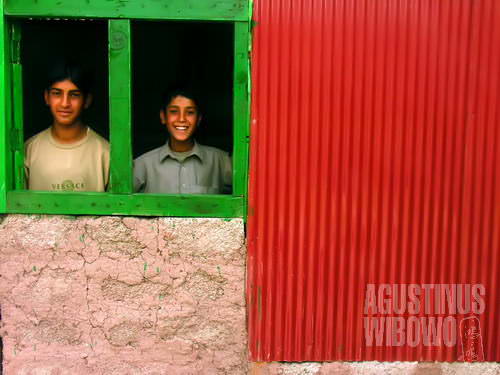
New home, new hope
March 18, 2006
After five consecutive months living in emergency tents, finally, Mr. Basyir had the chance for a celebration: a move to the new shelter. The Danish Muslim Aid, an NGO from Denmark, had provided the family with the building material, and three men from the family worked hard every day to build their new home, the new place to shelter the hopes and dreams remained after everything was devastated by the disaster.
Mr. Basyir was a typical example of the suffering victims of the disaster which rocked South Asia on October 8, 2005. The family, once consisted of the parents and ten children, now was smaller. Basyir had had six sons and four daughters. Three died. All boys. And the boys were the youngest in their family. The scars of the tragedy still rooted very deep on Mrs. Basyir. Her youngest boy looked like a Chinese boy, when he was alive. That youngest son was only two years old, and he was not recovered under the rubbles of the house. Mr. Basyir said that his wife cried on the first day she saw me, due to my Oriental face which reminded her to her beloved baby. The other two sons were also very young, and now resting peacefully in the family graveyard nearby.
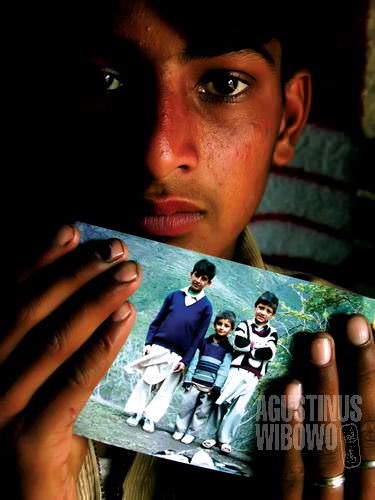
Dead brother
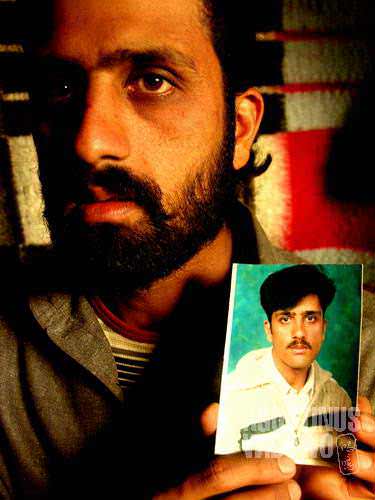
Mubashir, before and after
Mubashir, Mr. Basyir’s eldest son, was a boy of 22 years old. When the disaster came he was working in Muzaffarabad, and completely lost contact with his family. The road connecting the village of Noraseri, the hilly area north of the city, was completely blocked. Mubashir was among the lucky persons who survived the quake, and he struggled a two-day-journey through the jungle to get back to his house. The rubbles of the house, the three brothers who had passed away – two of them Mubashir had never seen for the last chance, and the demolished village, was the scene that he had to face, in reality. The youngest boy, that one with Oriental appearance, was picked up under the rubbles of his room, two days after the earthquake. The baby was not wounded, but he didn’t breath already. And on the same day the baby was buried immediately.
Life must go on. People cannot keep living under sorrows and tragedy. Mubashir now was working with the NGO, providing the building materials to the re-building villages. His two younger surviving brothers, Mudassar (16) and Amar (10), sometimes also came to our camp for chats and games. It was Mudassar who brought me to their camp and showed me the pictures, the memories, of his three died younger brothers. Basyir and his wife also joined, and I felt sorry that I, accidentally, re-opened their wounds. Mrs. Basyir felt that I was her son, replacing her Oriental baby. I saw the picture of the young baby, a picture which was taken a year and half before. It indeed looked like my baby-time photo. The other two dying sons were also very small, and very cute.
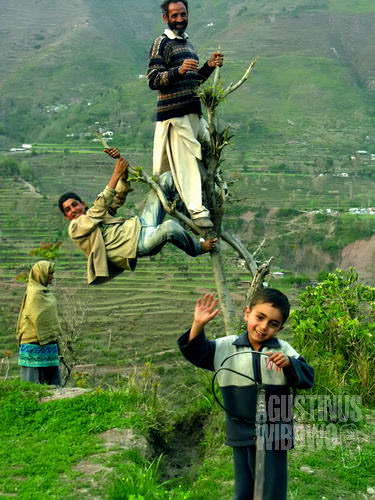
The happy family
As a common scene in Pakistan, families were usually extended. Basyir’s brother, living nearby, also lost some of their children and sisters. Their boys were very young; two babies were in the same room. One survived, one died. The survivor, Zein, a little active boy of six years old, seemed had forgotten the tragedy. He was evacuated the day later, and alive. His poor younger brother was found died under the rubbles of the room. The tomb of his brother, also a mini tomb in the family graveyard, was the place Zein and his cousins used to visit.
Ten children, three gone. Basyir was still optimistic about his future. They were quite well-doing family, proven by the rubbles of their used-to-be big house. Now, a small, lovely shelter was replacing. Basyir and his family were celebrating the ‘inauguration’ of their new shelter, with a mahfil (party), a night before. People from the neighborhood came to congratulate him and shared the happiness of the family. Before the mahfil, boys and girls were chanting the Koran in the new house. I misunderstood it was a madrassah (religious school), but it was reading to give blessing of the new house. I congratulated the family for their new life, and wishing that the tent life would not need to return back in their future.
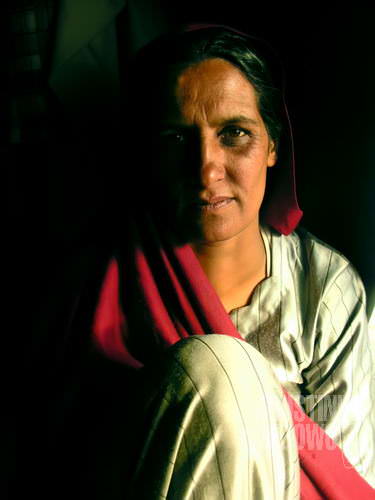
Mom
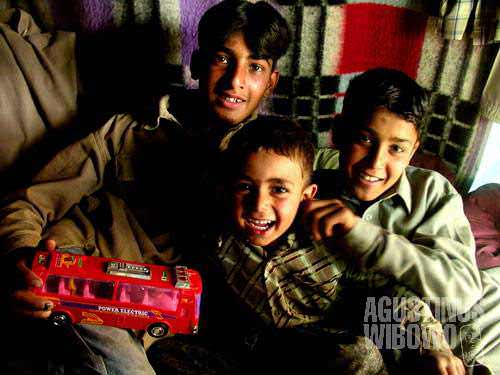
Having fun in tent
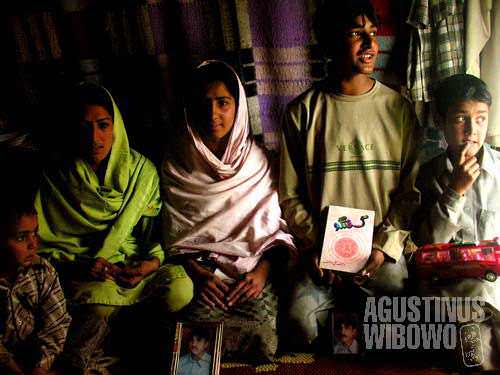
Brothers and sisters
Zein, the active little boy, was playing around with his little ‘car’, a set of woods and wheels, made by Mudassar, his cousin. Zein was running everywhere happily, climbing up and down, and asking for snaps. He was so happy to be photographed, and every time he saw his photo on the camera, he shouted “Baby Full!” (He actually meant ‘beautiful’). Mubashir’s sisters, as more commonly women in Pakistan, were quite embarrassed with cameras. Mubashir himself, now a heavily bearded man that all of his friends called him as ‘Sufi’, had never shaved since the disaster. I asked whether it was for mourning. He said no. Mubashir looked so much different from himself before the disaster, due to the thick beard. He looked quite mature, despite of his young age. He said that he was going to shave as soon as possible, but it seemed that he also enjoyed the ‘honour’ others giving by calling him ‘Sufi’. I told Mubashir that his house, facing directly to the massive, grand Nanga Parbat peaks (among the highest peaks on earth) was a potential place to attract visitors. He used to work in a hotel, and I suggested him that he might start a new tourism business in this area, offering traditional life of the friendly Kashmiri families and the gigantic snow-peaked mountains.
The Basyir family was one among thousands of families who suffered from the earthquake. But as they believe, life must go on, a new life must be started, and let the past wounds to past. They were indeed strong people, with high expectation and hope for the future.
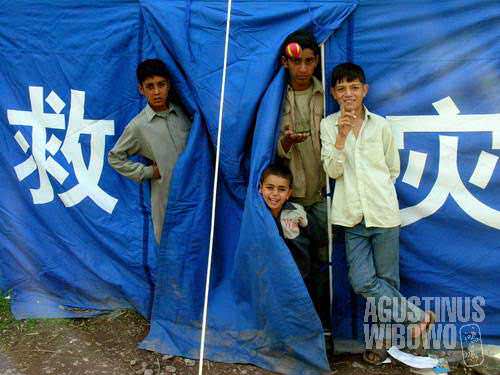
Tent school
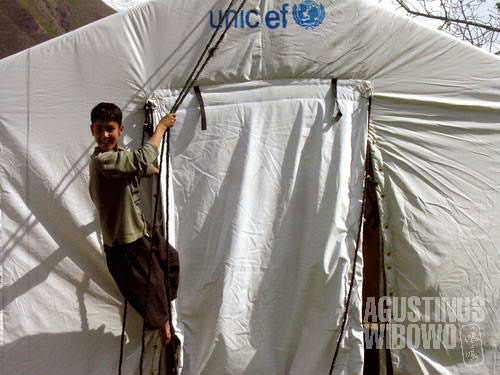
This soon will be history






Leave a comment